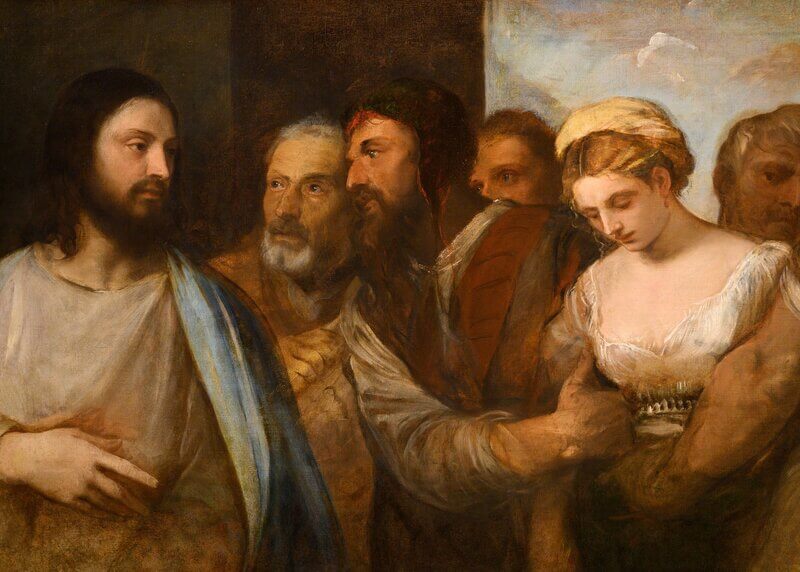Christ’s Compassion for the Wayward Soul
Many people wonder: Is God kind and compassionate, or angry and accusing? We all would like to think he is loving because we hear that he is. But does he really love us, or is this just an advertisement to get people to join a religion or a church? How do we really know? We know by looking at Jesus Christ, the One who is God in the flesh, and by his compassion for all he met.
The Woman Caught in Adultery
The Gospel of John records the touching story of a woman who was caught in adultery by some Jewish religious leaders:
The teachers of the law and the Pharisees brought in a woman caught in adultery. They made her stand before the group and said to Jesus, “Teacher, this woman was caught in the act of adultery. In the Law Moses commanded us to stone such women. Now what do you say?” They were using this question as a trap, in order to have a basis for accusing him. (John 8:3-6)
The Pharisees hoped that, however Jesus responded to their question, it would be a basis to condemn him. The Law of Moses required capital punishment for those found guilty of adultery (Deuteronomy 22:22). So, they tried to pit Jesus against Moses, hoping that Jesus would dismiss the need to keep the Law. The adultery law required stoning of both the guilty man and the woman, but the Pharisees didn’t bring the man. So, it’s clear that they didn’t intend to faithfully carry out the Law of Moses. And they didn’t really care about God’s justice or holiness.
It’s also obvious that they didn’t care for the woman. They had already condemned her and were now using her to carry out their plan, exposing her to shame and humiliation in the process.
Jesus’ compassion disarms the Pharisees
But Jesus bent down and started to write on the ground with his finger. When they kept on questioning him, he straightened up and said to them, “Let any one of you who is without sin be the first to throw a stone at her.” Again he stooped down and wrote on the ground. (John 8:6-8)
What Jesus wrote on the ground has been the subject of much conjecture. Some claim that he was writing down the sins of the men who were accusing the woman. But this is unlikely. It’s important to note that if John had thought that what Jesus wrote was important to the story, he would have included it. But he didn’t, so it remains an unknown.
At this, those who heard began to go away one at a time, the older ones first, until only Jesus was left, with the woman still standing there. (John 8:9)
Jesus turned their plot back on them. His indictment of “you who is without sin,” followed by his deafening silence and his unnerving act of writing on the ground, forced them to realize their own sinfulness. They all left the scene, one by one, not able to say a word. None of these men had the right to condemn another sinner. They were guilty before God also. The older men realized this before the younger and left first. At some time in their lives, some of the men may even had been guilty of the same sin as the woman’s.
Jesus’ compassion and call to repentance
Then Jesus made these stunning statements to the woman:
Jesus straightened up and asked her, “Woman, where are they? Has no one condemned you?” “No one, sir,” she said. “Then neither do I condemn you,” Jesus declared. “Go now and leave your life of sin.” (John 8:10-11)
As a man of compassion, Christ provided protection for her. He extended grace to her by not condemning her but affirming her worth. At the same time, being God himself, Jesus offered her God’s forgiveness.
At that point, the woman faced the most critical decision in her life: to respond to Christ’s compassion by accepting God’s forgiveness and turning from her sin, or continuing on as she had. She had such a great opportunity: to be acquitted of her guilt before God, freed of her sinful past, and accepted into God’s family. Her respectful response to Jesus showed she may have accepted God’s offer, but we don’t know for sure.
The earliest and most reliable manuscripts don’t include this story in John. But the story is fully consistent with what we know of the character and ministry of Jesus, and has been included in John’s gospel. I believe God gave us this story to demonstrate the love he has for sinful people, in fact for all of us. Jesus offered this woman what he longs for all to experience—freedom from guilt before God, and freedom to live a fruitful life that is pleasing to God.
The sin of pride
The Pharisees who accused the adulterous woman were acting in pride and self-righteousness. But by their behavior they were in danger of God’s anger and punishment. The apostle Peter wrote:
All of you, clothe yourselves with humility toward one another, because, “God opposes the proud but shows favor to the humble.” (1 Peter 5:5)
In accusing others, the Pharisees were fighting against God. And God did oppose them. This time the very Son of God led the fight against them, confronting them and rebuking them as only he could. We know from the gospels that many Pharisees never repented of their pride, but actually participated in condemning and crucifying the Son of God.
The sin of pride will always land us in trouble with God. Humility is a much safer path to take, for ourselves and for everyone around us.
What is God Like?
This story provides a stark contrast between Jesus and the Pharisees. The Pharisees were harsh and accusing, and Jesus was kind and compassionate. The Pharisees were self-righteous. But Jesus was truly righteous. He proved it by the love he had for others and for the Father. The Pharisees demanded immediate punishment for the woman. But Jesus provided her an opportunity to experience forgiveness and a pathway for repentance and restoration.
Christ is the image of the invisible God (Colossians 1:15). After his descent to earth, he was fully God and fully human. The apostle John recorded this conversation between Phillip the disciple and Jesus:
Philip said, “Lord, show us the Father and that will be enough for us.” Jesus answered: “Don’t you know me, Philip, even after I have been among you such a long time? Anyone who has seen me has seen the Father. How can you say, ‘Show us the Father’? Don’t you believe that I am in the Father, and that the Father is in me? (John 14:8-10)
Jesus demonstrated to other humans God’s thoughts and ways—what he is like. What we see in Jesus is how God really is.
God is compassionate
Is God really loving and kind? Yes, and we know he is by how Jesus treated people: with kindness and compassion. And if Jesus showed such compassion to this woman, then certainly he would have shown the same to any of us today.
We all live under condemnation for the sins we have done, to others and against God. But Christ gave his life so we would not be condemned but live in freedom. This is what God is like, and he truly does love us.
God is holy
God is also holy. And Jesus showed God’s holiness in his personal life and how he treated others. He loved others, and part of that love was calling people to a life of holiness. For this woman to have a relationship with God and live in his presence, she needed to repent of her sins and turn to God. For her own good and future blessing, Jesus told her to leave her life of sin.
We can see who God is by looking at Jesus. We know God through knowing Jesus. So, we can expect that God treats us like Jesus treated people: with kindness and compassion, but also with firmness regarding our sins. Paul taught that God’s kindness, not his condemnation, leads us to repentance (Romans 2:4). Christ’s compassion calls us to repentance so we can be pleasing to God and be useful to him in this life.
Impure religion
The book of James reminds us of two things that characterize pure religion:
Religion that God our Father accepts as pure and faultless is this: to look after orphans and widows in their distress and to keep oneself from being polluted by the world. (James 1:27)
Compassion toward others and holiness—both are important in our faith and our walk with God. One without the other is incomplete religion. In fact, James would say that one without the other is impure religion. Religion without compassion is cold and heartless. And religion without holiness is corrupt and contaminated. Both are displeasing to God our Father.
There is Only One Judge
Another reason we shouldn’t condemn others is that God is the judge of every human. And he is the only judge. James wrote:
There is only one Lawgiver and Judge, the one who is able to save and destroy. But you—who are you to judge your neighbor? (James 4:12)
In this passage “to judge” means to condemn. Our justice systems can judge and punish criminals for their crimes against society. But James is saying only God can judge and condemn people for who they are. And thus, only God can give a final punishment for their sins. And God will do this at the right time and occasion. There will be a day when God judges the whole world, and that day will be fearful and awesome. Notice that in this passage the only two outcomes for us after God’s judgment are salvation or destruction. James gives no other options. Notice also that the wicked and unrepentant will be destroyed. They will not be preserved to endure continual torment or suffering.
But that day of judgment has not come yet. So, we don’t have the right to condemn others for their sins. Only God has that right. Our perspective is limited and our view of other people is clouded. We can’t see into anyone’s heart—only God can do that. We can comment on sinful behavior all we want. But we can’t condemn or denigrate the worth of another person made in God’s image.
We all need compassion
There’s no place for pride in God’s kingdom. God’s people are all brothers and sisters in Christ, and stand on one level before God. We need to remember the old saying: “The ground is level at the foot of the cross.” All people are sinners in need of the Savior, and God’s people are sinners saved by grace. The apostle Paul wrote:
Be kind and compassionate to one another, forgiving each other, just as in Christ God forgave you. (Ephesians 4:32)
Since Christ forgave us of our sins, he obligates us to forgive one another. We all want others to show compassion to us. So, we need to extend Christ’s compassion to others. Now is not the time for judgment. It’s the time to extend mercy toward those who are wayward and to those who hate us and disagree with us.
Mercy triumphs
God promises that we who show mercy in this age will be rewarded by him in the next. This is because when we show Christ’s compassion, we are accurately portraying God to the world. We are expanding the knowledge of God and thus expanding God’s kingdom. James wrote:
Speak and act as those who are going to be judged by the law that gives freedom, because judgment without mercy will be shown to anyone who has not been merciful. Mercy triumphs over judgment. (James 2:12-13)
Those who refuse to extend mercy to others, like the Pharisees in the story, show that they have no understanding of God’s grace, and no personal knowledge of what God is like. If they don’t repent, all that awaits these people is God’s terrifying judgment.
Living out Christ’s compassion in the world
Because of what we know of God through Christ, we are confident that he is kind and compassionate. Have you experienced Christ’s compassion? He demonstrated it in his earthly life, and he shows it in our everyday lives today. So, God expects his people to do the same: to be kind and compassionate toward others.
Do you know someone who has failed in their personal life, their marriage, their job, or their relationships? If so, then show them Christ’s compassion. Tell them of God’s forgiveness and lovingly help them see their need for repentance. Or do you know someone who has just fallen on difficult times? Get involved in their life and take time to help them find a path to restoration. It could just be you helping them, or it could be leading them to counseling or an accountability group. Maybe what they need is a loving church family. But whatever the need, show them God’s love. This is the way of Christ, and he is pleased when we take it.
Following Jesus Christ as Lord, we follow his way of life and his manner of treating other people. As we do, we become more like him: kind, compassionate, and holy. In doing so, we become the means by which Christ shows his compassion to the world, expanding people’s knowledge of God and extending his eternal kingdom.
Christ in Scripture is listed on Feedspot Top 200 Christian Blogs.







1 thought on “Christ’s Compassion for the Wayward Soul”
Thank you so much for your continued study, research, and inspiration in showing how God reveals to us his perfect love. This was especially helpful to me showing that we just need to be more like Christ in how we respond to the sins and the shortcomings of all. Love, caring, sharing are attributes that we need to show, which lead to forgiveness over judging. Thanks.